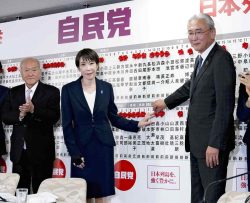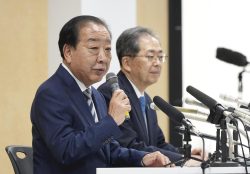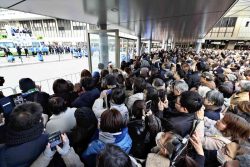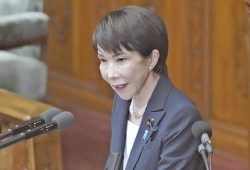Show paths to policy goals in lower house election campaign / Economic revitalization ability to be judged
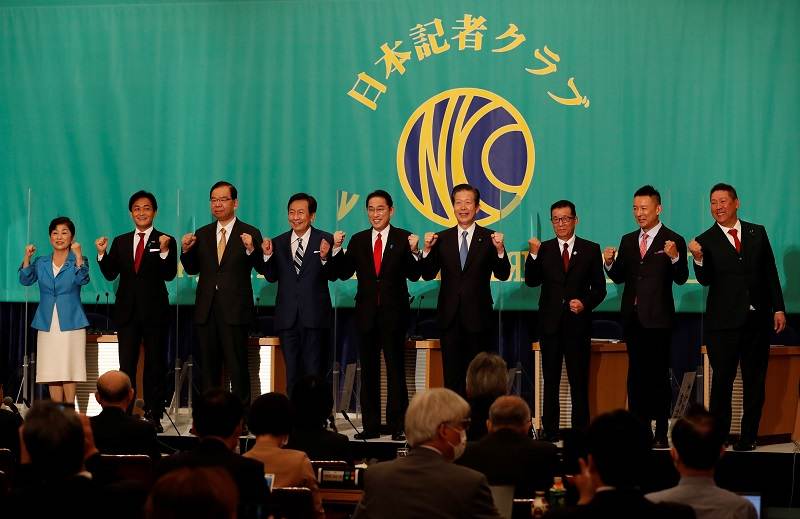
The Social Democratic Party head Mizuho Fukushima, the Democratic Party for the People leader Yuichiro Tamaki, the Japanese Communist Party Chairman Kazuo Shii, the Constitutional Democratic Party of Japan leader Yukio Edano, Japan?fs Prime Minister and ruling Liberal Democratic Party President Fumio Kishida, Komeito party leader Natsuo Yamaguchi, The Japan Restoration Party, also known as the Japan Restoration Association, leader Ichiro Matsui, Reiwa Shinsengumi party leader Taro Yamamoto, and leader of the party fighting against NHK in the trial for violating Article 72 of the Attorney Act Takashi Tachibana pose for a photograph at the start of debate session ahead of October 31, 2021 lower house election, at the Japan National Press Club in Tokyo, Japan October 18 , 2021.
12:53 JST, October 19, 2021
In the midst of difficult circumstances such as the spread of infectious diseases, economic stagnation and global turmoil, which party will be entrusted with steering Japan over the next four years? This will be decided in this important election.
Campaigning for the 49th House of Representatives election officially starts today. Opposition parties, with the largest one, the Constitutional Democratic Party of Japan, at their center, have been working to form a united front against the just-launched administration of Prime Minister Fumio Kishida. Each party should present concrete and convincing measures to deal with difficult issues.
Is redistribution enough?
Under the administrations of the two most recent prime ministers, Shinzo Abe and Yoshihide Suga, which lasted nearly nine years in total, corporate performance recovered and stock prices rose through the Abenomics economic policy package. What they failed to do, however, was raise wages sufficiently, and dissatisfaction over the income gap increased.
Understandably, the ruling and opposition parties alike insist on rectifying disparities and expanding the middle class in their campaign pledges. Each party must not only set forth ideals, but also discuss paths to solve the problems.
It is vital for each party to consider how to position the redistribution of wealth and economic growth for the full-fledged revitalization of the Japanese economy.
During a debate of nine party leaders organized by the Japan National Press Club, Kishida, who is also the president of the ruling Liberal Democratic Party, praised Abenomics by saying it “has produced many results for growth.”
At the same time, regarding a “new form of capitalism” that he has touted, Kishida explained that he would promote policies such as wage hikes through cooperation between the public and private sectors, rather than leaving them up to the private sector.
Although the Abe administration also called on companies to raise wages and offered tax breaks, such measures failed to take effect at mainly small and midsize companies. The focus will be on whether each party can propose highly effective measures during the election campaign.
CDPJ leader Yukio Edano, criticizing Kishida’s stance as being “no different from the politics that have benefited large companies,” called for creating growth by using as starting points reductions in the consumption and income taxes and the provisioning of benefits. The party intends to raise taxes on wealthy individuals and large companies in order to correct the uneven distribution of wealth.
But redistribution of wealth alone will not lead to sustainable economic growth. It is necessary to create a vibrant economy through measures such as investing in growth sectors.
Nippon Ishin no Kai (Japan Innovation Party) leader Ichiro Matsui said, “Reforms are necessary to achieve growth.” Democratic Party for the People leader Yuichiro Tamaki stressed the need to “shift to an aggressive fiscal policy to create an economy in which wages will be raised.”
Natsuo Yamaguchi, leader of ruling coalition partner Komeito, stated that the party wants to “provide ¥100,000 per child, from newborns to 18-year-olds.”
All parties are calling for more benefits for businesses and people in need who have been hit hard by the novel coronavirus pandemic.
The issuance of a large amount of deficit-covering government bonds and the failure to mention the prospects for fiscal consolidation could lead to voters’ distrust of politics. It is important to present responsible policies and visions, rather than to compete with each other over pork-barrel measures.
Maintain strong defense
To revive the economy, it is essential to take measures to prevent the coronavirus from spreading again.
The prime minister has shown his policies to secure enough hospital beds to deal with coronavirus variants that may be twice as contagious as the conventional type and to ease restrictions on people’s social activities by using vaccination certificates or other means.
Edano emphasized his intention to thoroughly contain infections through measures such as strengthening border controls and drastically increasing the number of PCR tests.
Nearly 70% of people in Japan have received two doses of the vaccine and it is believed that the risk of death or becoming seriously ill has been reduced. Each party should provide specific guidelines on how to balance curbing infections and economic activity.
Kishida expressed his intention to review the national security strategy and increase defense spending to deal with new challenges. He also showed his willingness to improve the ability to prevent missile attacks.
Edano said his party will take a “resolute” stance toward China and North Korea based on the Japan-U.S. alliance.
The policy agreements of the CDPJ, the Japanese Communist Party, Reiwa Shinsengumi and the Social Democratic Party, however, call for the partial abolition of the security-related laws and a halt to the relocation of the U.S. Marine Corps’ Futenma Air Station in Okinawa Prefecture to the Henoko district of Nago in the prefecture.
Peace and prosperity cannot be secured simply by saying “resolutely.” Opposition parties must dispel concerns they will repeat the same mistakes made by the administration of former Prime Minister Yukio Hatoyama that worsened Japan-U.S. relations when he called for the relocation of the Futenma base to somewhere outside the prefecture.
Offer administrative plans
This time, the CDPJ, the JCP, the DPFP, Reiwa and the SDP will be unified behind a single candidate in more than 210 single-seat constituencies. The purpose of this combination is for the opposition parties to fight together to challenge the LDP-Komeito ruling coalition.
JCP Chair Kazuo Shii said his party will “cooperate to replace the LDP-Komeito government.” If a change of government is realized, the JCP will provide “cooperation outside the cabinet in a limited manner,” while in some cases it will oppose bills submitted by the administration, according to Shii.
Each party needs to thoroughly explain what the framework of its cabinet would be and how its administration would be stably run.
Top Articles in Politics
-

Japan PM Takaichi’s Cabinet Resigns en Masse
-

Sanae Takaichi Elected 105th Prime Minister of Japan; Keeps All Cabinet Appointees from Previous Term
-

Japan’s Govt to Submit Road Map for Growth Strategy in March, PM Takaichi to Announce in Upcoming Policy Speech
-

LDP Wins Historic Landslide Victory
-

LDP Wins Landslide Victory, Secures Single-party Majority; Ruling Coalition with JIP Poised to Secure Over 300 seats (UPDATE 1)
JN ACCESS RANKING
-

Japan PM Takaichi’s Cabinet Resigns en Masse
-

Japan Institute to Use Domestic Commercial Optical Lattice Clock to Set Japan Standard Time
-

Israeli Ambassador to Japan Speaks about Japan’s Role in the Reconstruction of Gaza
-

Man Infected with Measles Reportedly Dined at Restaurant in Tokyo Station
-

Man Infected with Measles May Have Come in Contact with Many People in Tokyo, Went to Store, Restaurant Around When Symptoms Emerged


